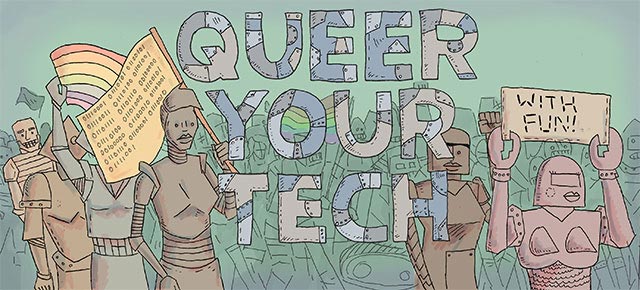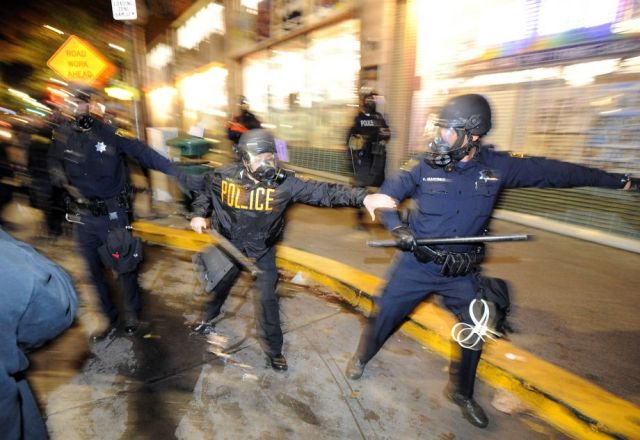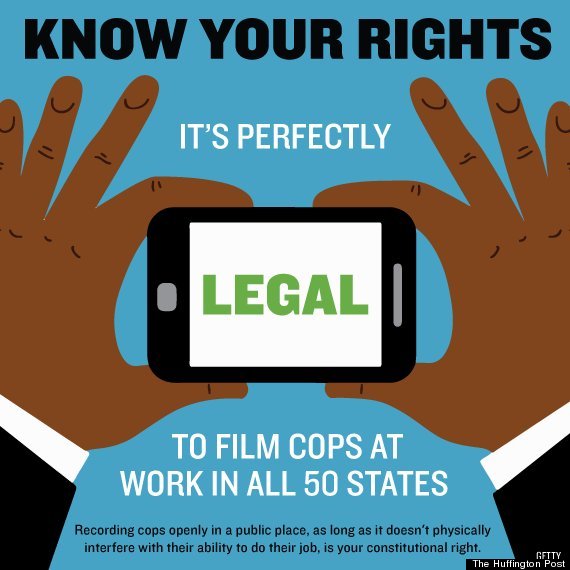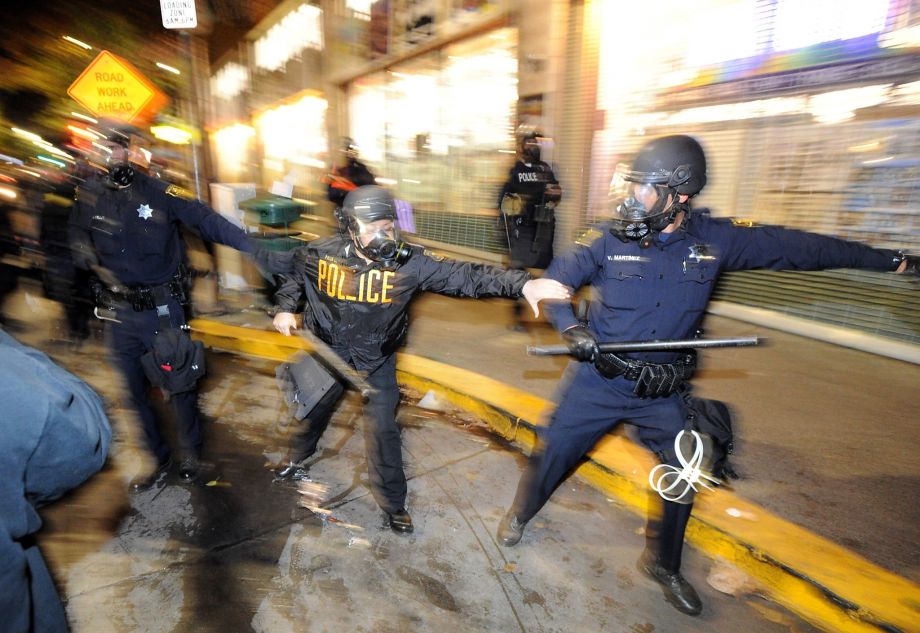
The use of smartphones and social media have been critical in large and small-scale grassroots organizing, from the Arab Spring in 2011 to #BlackLivesMatter protests currently sweeping across the US in the wake of the grand jury decisions to not indict the police officers who murdered Mike Brown and Eric Garner. Carrying phones has become vital for documenting, staying connected to other organizers and staying safe.
However, carrying phones also carries risk, because communications between them are subject to surveillance, and because they hold so much information about our lives. While this data is technically — partially — protected from search by the Fourth Amendment, it shouldn’t come as a surprise that our right to privacy is not always honored by law enforcement. Police have many tactics for extracting data both through surveillance and direct intimidation and coercion. It’s important to know how to protect yourself and your data, and to know your rights related to your electronics if you are protesting and interacting with or near law enforcement.

This is by no means a complete list, I am not a legal expert, and taking these steps cannot guarantee your safety or privacy, especially in the face of heavy police militarization, and especially for heavily-targeted black, brown, trans and queer bodies. Here are three things related to your tech that are important to keep in mind when protesting:
1. You have the right to record the police
As the non-indictment in Eric Garner’s murder has reminded us, having video of police breaking the law doesn’t guarantee they will be held accountable. However, it has been shown that when police are filmed, it can help deescalate the situation and protect people from being assaulted or having their rights violated.
The precise rules and specifications vary from state to state, particularly with regards to sound, because some states count the audio portion of videotaping as wiretapping. But across the board, if you are in a public space, you are allowed to photograph and document video footage of the police. Police won’t necessarily like this, and they may tell you to stop, but as long as you are on public property, you have the right to do so.
If your phone is able, it is good to find a way to stream video directly from your phone to the internet, or post photos online directly after taking them. This makes it so even if your phone is taken and opened by the police, they cannot delete the photos or footage.
We’ve talked about apps created by the ACLU for filming police before, which come equipped with know your rights reminders and can also help protect your footage. CopBlock also has a list of apps for streaming video straight from your phone to the internet.

2. You have the right to refuse the police access to your phone
This summer, the Supreme Court handed down a decision that specified that if you are arrested, police are not allowed to search your phone without your consent or a warrant. In his opinion, Chief Justice Roberts said cellphones “are not just another technological convenience… they hold for many Americans ‘the privacies of life.’”
However, this doesn’t mean that an officer won’t ask or pressure you to unlock your phone. If you find yourself being asked by an officer to unlock your phone, you can say you do not consent and ask to speak to your lawyer.
HOWEVER, a Virginia Circuit Court judge recently ruled that you CAN be compelled to use your fingerprint to open your phone if it is only locked by a fingerprint scan. This opens a new avenue of ambiguity for what does and doesn’t qualify as a justified search, but ultimately what it means is it is critical that your phone be protected by a passcode.

3. Delete your unnecessary data or carry a temporary phone
Even though you are constitutionally protected, it’s still possible for police to gain access to your phone and your data by coercion, intimidation or surveillance. Thus, it is important to consider how you want to protect your data if you think you might end up in a protest situation where you are interacting with law enforcement. To minimize the amount of information police can obtain about you if they are looking at data coming to and from your phone or if they do gain access to your phone, delete unnecessary applications and information before protesting.
Protecting your data can be especially important for queer and trans people. If your phone has photos, apps or other data that could out you or otherwise subject you to increased risk of profiling or violence by police if they manage to see it, consider removing that information before you protest. The Chicago National Lawyers Guild teamed up with the Sylvia Rivera Law Project and the National Center for Transgender Equality to make a know your rights sheet for trans and queer people participating in direct action.
NDTV has guides to securely delete your personal data from your iPhone or Android.
Another way to avoid carrying all of your data around with you during a protest is to get a temporary device that isn’t attached to your name. If that’s not feasible, the Electronic Frontier Foundation has a Cell Phone Guide for US Protesters, which notes, “Text messages… can be read and stored by your phone company or by surveillance equipment in the area.” If you want to protect the content of your messages from being read by law enforcement, use apps like WhatsApp that use end-to-end encryption.
Check out the Electronic Frontier Foundation’s extensive Surveillance Self-Defense Guide for Activists or Protesters to learn more.
This has been the one-hundred-eighth installment of Queer Your Tech with Fun, Autostraddle’s nerdy tech column. Not everything we cover is queer per se, but we talk about customizing this awesome technology you’ve got. Having it our way, expressing our appy selves just like we do with our identities. Here we can talk about anything from app recommendations to choosing a wireless printer to web sites you have to favorite to any other fun shit we can do with technology. Header by Rory Midhani.








Comments
Thank you so much for writing this, Maddie. It’s such an incredibly important subject and gives people a good reminder to be proactive about the data we carry with us.
In this regard, Apple users have some incentives to run the latest version of iOS. Apple tells law enforcement and govt agencies that due to the security restrictions of iOS 8, it cannot comply with requests for data access. They’ve got a whole page to address this.
Stay safe out there!
Thanks for this great tip!
I usually carry an actual camera with me in my jacket pocket or on my side. I want to double check, but if I am not mistaken point #2 applies to actual cameras, correct?
So the ACLU agrees that the case referred to in point 2 (Riley v California) should apply to cameras, however there is some grey area because the case only specifically refers to phones. For photographers, I’d check out the ACLU’s Photographers’ rights page for more specifics.
This was very informative. Thanks Maddie
I really love this article. I feel that the best way to protect yourself is to know the laws as they apply to you. It’s really surprising, when talking to friends or people in my community to realize how many people don’t know their rights. I feel like this really advocates that, awesome article!